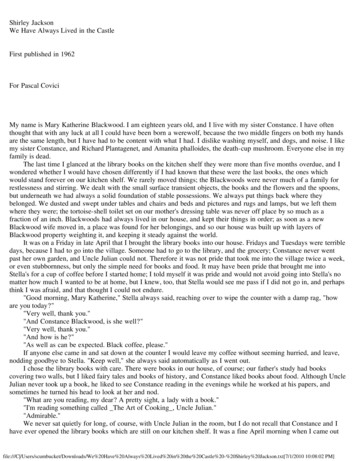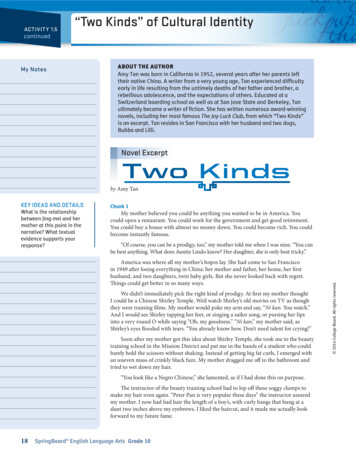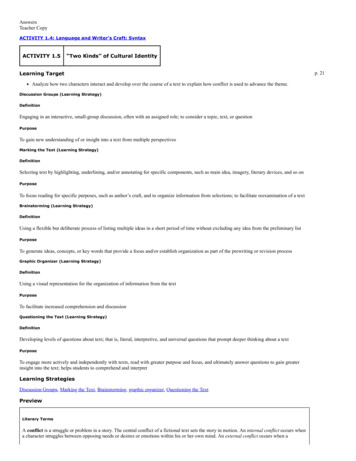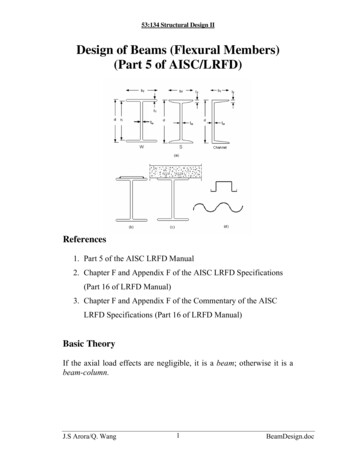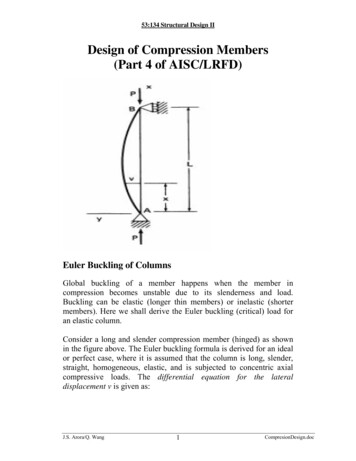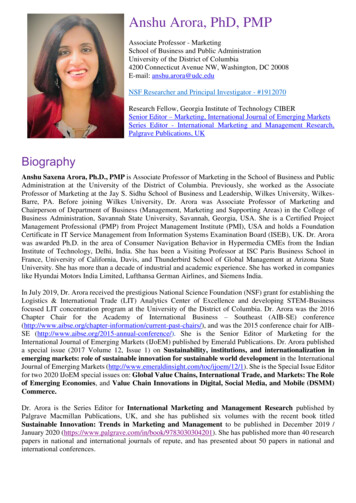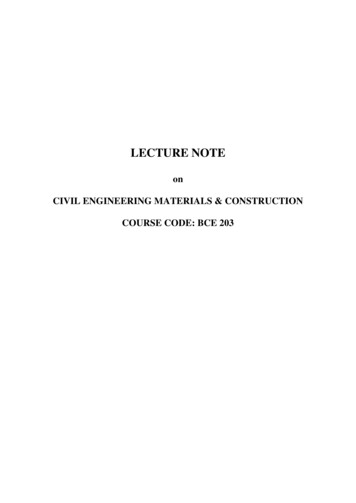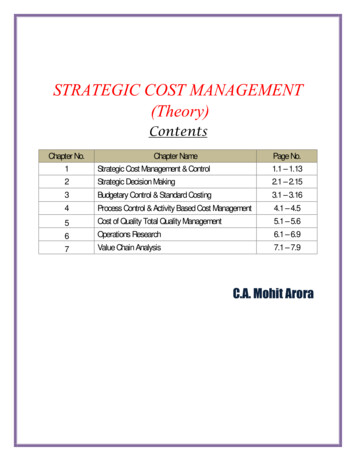
Transcription
By Shirley L. AroraCover Illustration by Larissa SharinaCover Design by Elle Staples 2018 Jenny Phillips (www.jennyphillips.com)Originally Titled What Then, Raman?First Published in 1960
Table of ContentsCHAPTER ONE . . . . . . . . . . . . . . . . . . . . . . . . . . . . . . . . . . . . . . . . . . . . . . . . 1CHAPTER TWO . . . . . . . . . . . . . . . . . . . . . . . . . . . . . . . . . . . . . . . . . . . . . . . 9CHAPTER THREE . . . . . . . . . . . . . . . . . . . . . . . . . . . . . . . . . . . . . . . . . . . . . . 18CHAPTER FOUR . . . . . . . . . . . . . . . . . . . . . . . . . . . . . . . . . . . . . . . . . . . . . . . 23CHAPTER FIVE . . . . . . . . . . . . . . . . . . . . . . . . . . . . . . . . . . . . . . . . . . . . . . . . 29CHAPTER SIX . . . . . . . . . . . . . . . . . . . . . . . . . . . . . . . . . . . . . . . . . . . . . . . . . 39CHAPTER SEVEN . . . . . . . . . . . . . . . . . . . . . . . . . . . . . . . . . . . . . . . . . . . . . . 49CHAPTER EIGHT. . . . . . . . . . . . . . . . . . . . . . . . . . . . . . . . . . . . . . . . . . . . . . . 56CHAPTER NINE. . . . . . . . . . . . . . . . . . . . . . . . . . . . . . . . . . . . . . . . . . . . . . . . 62CHAPTER TEN. . . . . . . . . . . . . . . . . . . . . . . . . . . . . . . . . . . . . . . . . . . . . . . . . 70CHAPTER ELEVEN . . . . . . . . . . . . . . . . . . . . . . . . . . . . . . . . . . . . . . . . . . . . . 76CHAPTER TWELVE. . . . . . . . . . . . . . . . . . . . . . . . . . . . . . . . . . . . . . . . . . . . . 83CHAPTER THIRTEEN. . . . . . . . . . . . . . . . . . . . . . . . . . . . . . . . . . . . . . . . . . . . 90CHAPTER FOURTEEN. . . . . . . . . . . . . . . . . . . . . . . . . . . . . . . . . . . . . . . . . . . 98CHAPTER FIFTEEN. . . . . . . . . . . . . . . . . . . . . . . . . . . . . . . . . . . . . . . . . . . . . 104CHAPTER SIXTEEN. . . . . . . . . . . . . . . . . . . . . . . . . . . . . . . . . . . . . . . . . . . . . 113
Tiger on the MountainPage 1CHAPTER ONEMunuswamy the schoolmaster drew his big, round goldwatch out of his pocket, held it at arm’s length, and tilted hishead back so that he could look at the dial through the lowerhalf of his glasses. In another two minutes it would be fouro’clock. Munuswamy nodded, pleased. After so many years, hescarcely needed the watch to tell him that it was time for schoolto end.He put the watch away and looked around the room, thistime peering through the top part of his glasses. The thirty ormore boys of varying sizes sitting cross-legged on the floorwere all apparently busy with their studies. Surely the noisewas enough as they recited their lessons aloud, each trying totalk louder than his neighbor so that he could hear himselfspeak. But wait—there was one silent figure, back in the corner,sitting hunched over something spread on the floor in front ofhim. Raman, the woodcutter’s son—reading as usual, and nothis lesson either! Munuswamy frowned and shook his head.He rapped on the desk with the pointing stick that was neverout of his hand. The noise in the room stopped, suspendedmid-sentence. Everyone, including Raman, sat up straight, eyeson the schoolmaster. Munuswamy waited a full, silent moment.Then he announced carefully, precisely:“School is dismissed.”Quietly, one by one, the boys rose and filed out. Munuswamywatched their thin, straight backs as they disappeared through
Page 2Tiger on the Mountainthe door. Once outside they would break into a run, whoopingacross the dusty bit of yard that surrounded the schoolhouse,clambering from foothold to foothold up the short, steep slopeto the road above.“Raman, wait a moment.” Munuswamy spoke as thewoodcutter’s son, last in line, reached the door.Raman turned. “Sir?”“Come here.” The boy approached uncertainly, his eyeslingering for a moment on the pointing stick that Munuswamystill held.“What was it today? Fables? Legends? Poetry?” theschoolmaster demanded.Raman grinned shamefacedly and ducked his head. “Stories,sir, stories about heroes of ancient India! Just see!” He reachedinside his shirt and drew out a small booklet, worn andsmudged with dirt.Munuswamy took the book, ruffled the pages, and shook hishead. He handed it back to Raman. “Where did you get it?”“I bought it myself from Tumbuswamy the bookseller, withmoney I saved from festival days.” Raman spoke proudly,standing tall and straightening his thin shoulders.“So you would rather buy books than sweets for the festivals.”“Yes, sir.”Munuswamy peered at the boy sharply through the upperpart of his glasses. Raman was the only one of his pupilswho came, not from town, but from one of the outlying farmsettlements nestled in the hills beyond the lake. How it hadhappened that Raman was allowed to attend the school,Munuswamy did not know. Usually the farm children werekept too busy at home or lived too far away to come to the
Tiger on the MountainPage 3town every day. But Raman had first come a year ago, full ofpride and eager to learn, and as the time passed, he had becomeMunuswamy’s star pupil, though the schoolmaster took care toconceal that fact.“Raman,” Munuswamy asked suddenly, “how manynaya-paisa to one rupee?”“Why, one hundred, of course!” Raman answered, startled.Anyone would know that. It was several months already sincethe little copper naya-paisa coins had been issued to replace theold anna coins.“And how many annas equal one rupee?”“Sixteen,” Raman answered readily.“So then, if someone were to give you naya-paisa in exchangefor one anna coin, how many would he give you?”Raman gazed at the floor, trying to make the figures appearthere as though he were scratching them in the dirt with a stick,as he did when he wrote his lessons. But it would not work. Atlast he shook his head, eyes still downcast.“I don’t know, sir.”Munuswamy allowed a long moment of silence to followRaman’s answer. Then he spoke slowly. “Raman, you are one ofthe best readers in the school.”Raman nodded, but without looking up.“You are also one of the worst in arithmetic.”Raman nodded again.“Reading is all very well. But—” Munuswamy rapped hisstick against the wall and Raman gave a start, “how will yousell wood when you are grown if you cannot keep accounts?How will you buy in the bazaar if you do not know whether the
Page 4Tiger on the Mountainshopkeeper gives you the correct change?”Raman stood without speaking.“Tomorrow,” Munuswamy the schoolmaster announced,“you will recite, Raman. You will know how to change annasinto naya-paisa and naya-paisa back into annas again. If you donot—” He left the sentence unfinished, but the hand that heldthe pointing stick twitched a little.Raman swallowed hard, eyes on the stick, and winced at theimagined consequences. “Yes, sir. Good day, sir.” He touchedone hand to his forehead in a salute of respect and turned toleave, thrusting the little book inside the front of his shirt again.Once outside he broke into a run, fairly leaping across the yardand up the little slope to the road. He did not look back, and hedid not see Munuswamy the schoolmaster step to the doorwayto watch him, the pointing stick still in his hand and a smilelifting the corners of his thin lips.The other boys had already disappeared, but Raman caredlittle, for he did not seek their company. A year ago, whenRaman had first come to the school, the others had asked himeach day to join them in their after-school play down by thelake. Raman had always refused, anxious to get home in timeto finish his chores and still have some daylight left in which tostudy. As time went on, the other boys no longer bothered toask. Later Raman had sometimes wished they would, for he wastoo shy to join them without an invitation. But today it did notmatter. Today he had the book. He could feel it jiggling againsthis body as he scaled the slope in great leaps.Raman hurried along the schoolhouse road until it mergedwith the steep bazaar street. Up the street he turned, but longbefore he reached the top he had stopped running and was
Tiger on the MountainPage 5walking slowly and breathing heavily. When at last he came tolevel ground, he squatted down beside the road to rest, rubbinghis nose with his hand because the cold air he had gulped inwhile running had made it tickle.The afternoon was chilly indeed, and clouds rising in thesouthwest promised rain during the night. Far above Raman’shead, the wind sighed through the long gray leaves of the bluegum trees. Long shadows stretched across the road, crowdingout the pale warmth of the late afternoon sunshine.As he rested, Raman tried reciting under his breath: “Onehundred naya-paisa make one rupee. Sixteen annas make onerupee. Twenty-five annas make one quarter of a rupee. And soone anna equals—” He broke off, scowling. How complicated itall was! The new money was supposed to be easier, but learningto change from the old to the new was hard indeed.Raman picked up a twig and drew twenty-five little markson the ground. Then he tried dividing them up into four equalgroups. But there was an extra mark left over, and he did notknow what to do with it. He threw the stick down in disgustand sat back on his heels.A bullock cart rumbled past and headed down the hill, withthe grating shriek of wooden brakes against rough woodenwheels. Raman waved to the driver, who returned the greeting.He rose then and continued on up the street, keeping just offthe edge of the sidewalk because the dusty ground felt better tohis bare feet than did the cold concrete pavement.Over on the other side of the road, the last of the vegetablesellers was slowly putting away in her basket the few bunchesof carrots and beets that had not been sold that day. She caughtsight of Raman and called out, “Your mother has gone home.She sold all her vegetables by noontime; she was that lucky.”
and sat back on his heels. A bullock cart rumbled past and headed down the hill, with the grating shriek of wooden brakes against rough wooden wheels. Raman waved to the driver, who returned the greeting. He rose then and continued on up the street, keeping just off the edg
